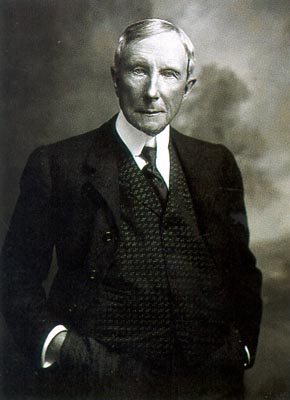
John Davison Rockefeller, Sr. (July 8, 1839 –May 23, 1937) was an American industrialist and philanthropist. Rockefeller revolutionized the petroleum industry and defined the structure of modern philanthropy. In 1870, Rockefeller founded the Standard Oil Company and ran it until he retired in the late 1890s. Standard Oil began as an Ohio partnership formed by John D. Rockefeller, his brother William Rockefeller, Henry Flagler, chemist Samuel Andrews, and a silent partner Stephen V. Harkness. Rockefeller kept his stock and as gasoline grew in importance, his wealth soared and he became the world's richest man and first U.S. dollar billionaire, and is often regarded as the richest person in history. Standard Oil was convicted in Federal Court of monopolistic practices and broken up in 1911. Rockefeller spent the last 40 years of his life in retirement. His fortune was mainly used to create the modern systematic approach of targeted philanthropy with foundations that had a major effect on medicine, education, and scientific research. His foundations pioneered the development of medical research, and were instrumental in the eradication of hookworm and yellow fever. He is also the founder of both University of Chicago and Rockefeller University . He was a devoted Northern Baptist and supported many church-based institutions throughout his life. Rockefeller adhered to total abstinence from alcohol and tobacco throughout his life.
He married Laura Celestia ("Cettie") Spelman in 1864 and outlived her. The Rockefellers had four daughters and one son; John D. Rockefeller, Jr. "Junior" was largely entrusted with the supervision of the foundations.
Source: Wikipedia.com
Here are the Success Traits:
JOHN D. ROCKEFELLER Biography
Organize, Create Systems and Order, and Hire the Right People:
[From the start Rockefeller showed a genius for organization and method. The firm prospered during the Civil War (1861–65), when Confederate (Southern) forces clashed with those of the Union (North). With the Pennsylvania oil strike (1859) and the building of a railroad to Cleveland, they branched out into oil refining (purifying) with Samuel Andrews, who had technical knowledge of the field. Within two years Rockefeller became senior partner; Clark was bought out, and the firm Rockefeller and Andrews became Cleveland's largest refinery.]
Work Hard with Focus at Something You Are Passionate About:
[Rockefeller's personal life was fairly simple. He was a man of few passions who lived for his work, and his great talent was his organizing genius and drive for order, pursued with great single-mindedness and concentration. His life was absorbed by business and family (wife Laura and four children), and later by organized giving. He created order, efficiency, and planning with extraordinary success and sweeping vision.]
Put Your Soul Into It
Be Energetic, Ambitious, and Generous:
[ Self-made billionaire, John Davison Rockefeller (1839-1937) approached life with energy and ambition. Born in Richford, New York, he was raised to work hard, save, and be generous.
Called the world's greatest philanthropist, in his lifetime he gave away over $530,000,000.
"I believe that every right implies a responsibility; every opportunity, an obligation; every possession, a duty," said the successful entrepreneurs.
Like his contemporary Andrew Carnegie, Rockefeller started with little. In 1859, with $1,000 saved and another $1,000 borrowed from his father, Rockefeller formed a merchant partnership with neighbor Maurice Clark.]
Learn from Your Mistakes:
In 1863, the duo added partner, Samuel Andrews and turned to oil production. "I always tried to turn every disaster into an opportunity," Rockefeller explained.
Two years later, Rockefeller bought the refinery business outright for $72,500 and expanded. He formed Standard Oil in 1870, which at its peak controlled 90% of the U.S. oil industry and according to Rockefeller, "revolutionized the way of doing business all over the world."]
Take the Path Less Traveled:
["If you want to succeed you should strike out on new paths rather than travel the worn paths of accepted success," said the successful capitalist icon.]





No comments:
Post a Comment